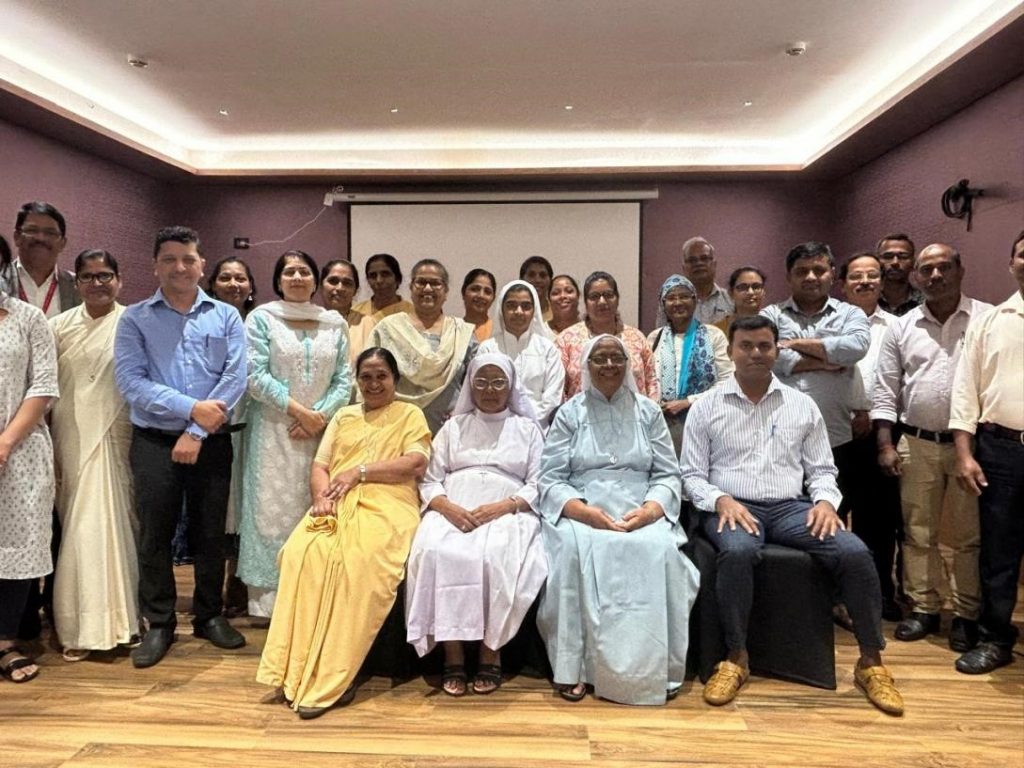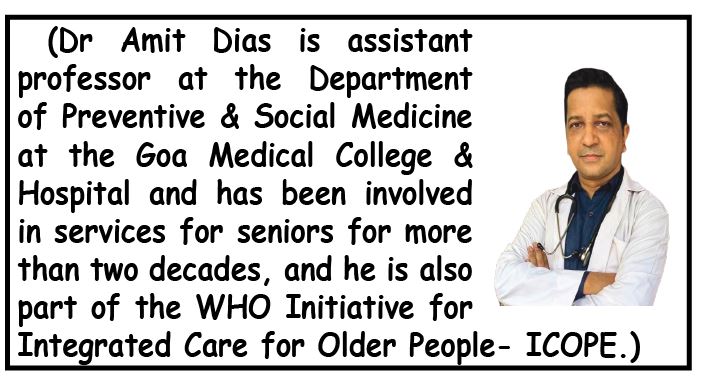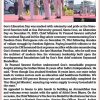Goa is abuzz with excitement as vintage bike and car owners, users, collectors and fans are decking […]

STRENGTHENING CARE AND SUPPORT SYSTEM FOR ELDERS!
MIND & BODY, HEART & SOUL, Oct 05- Oct 11 2024 October 4, 2024International Day for Elder People
On the occasion of the International Day for Older People, observed on October 1, we spoke to Dr Amit Dias, to get better insights on active and healthy aging. He says, “Everyone wants to live long, but no one wants to grow old!” Here is an insightful interview in which he explains how to age well…the theme this year is strengthening care and support systems for elders in our society…
A Q&A interview with Dr Amit Dias
Goan Observer: Let’s start by understanding why we need to observe World Elders Day?
Dr Amit Dias: Our research through the DIL Project has revealed that everyone wants to live long, but no one wants to grow old. This is because they are afraid of being sick and bedridden and dependent or with a mental illness and they will be a burden on others in their later life. The challenges faced by senior citizens are multifaceted. We need to focus on “aging well,’ on improving our daily diet and promoting active aging – things which make all the difference between healthy and sick.
We need to build capacity to care both in the homes as well as the institution. Recently I had the opportunity to conduct a workshop for people running old age homes in Goa and on strengthening the capacity to deal with mental health problems. The workshop was very well received. The theme this year is Strengthening care and support systems for elders. We need to provide all round support – physical, mental, social and not least of all financial.
Q: To put things in the right perspective, how big is the problem?
A: According to the WHO nearly 80% of older people live with at least one chronic condition, such as heart disease, stroke, cancer, diabetes or chronic respiratory disease. The UN estimates that by 2050 the number of people aged 60 years and above will reach 2.1 billion, which in turn will place tremendous pressure on healthcare systems globally.
As people age their susceptibility to ageing conditions increases, often leading to reduced quality of life and increased dependence on healthcare services if there are any. The WHO reports that about 15% of older adults have a mental illness, with dementia affecting around 55 million people worldwide, a number projected to triple by 2050.
We can also experience the social changes in our own families and community — the elderly often experience isolation due to shrinking family size, urbanization and migration of a younger generation. The loss of social networking and community support contributes to loneliness, which can have severe implications for mental health and physical well-being.
Q: What about financial problems? Isn’t that a growing concern?
A: Yes it is, financial problems also play a significant role in the well-being of seniors, particularly in developing countries. A UN report highlights that only about 20% of the world’s older population has access to pension schemes, leaving many financially vulnerable. In India, the elderly population is growing, with an expected 139 million elderly by 2031 (10.1% of the total population), but the coverage of social security systems remains inadequate, leading to a situation where seniors may be asset-rich but cash-poor.
Many a times they die rich but live a poor life, debating whether to spend or save for later years and constantly worrying about the future. We need to promote the concept of AGING WELL.
Q: Could you suggest some ways seniors could practice aging well ?
A: Sure! Here is a simple way to remember what to do to age well:
• Active aging: Engage in physical activity daily, climb stairs, walk everyday.
• Growth mindset: Keep learning, stay positive have a purpose. Enrich social connections.
• Eat healthy: Follow a balanced, nutritious diet.
• Watch for signs of mental stress: Seek help if you’re feeling depression
• Ensure compliance with medications
• Laugh often: Humor lightens life.
• Love yourself: Prioritize self-care
Q: .How is our country responding to the problem?
A: In India, we are still in the process of adjusting to this demographic transition. But the government has taken note of the same. India’s elderly population is rapidly increasing, and according to the UN Population Division, by 2050, 20% of India’s population will be over 60 years old. This will bring immense challenges in terms of healthcare provision, social security and infrastructure.
The National Program for Health Care of the Elderly (NPHCE) started in 2010, is an important step in addressing these issues, but its reach and effectiveness need to expand significantly. While India has initiated efforts like geriatric care centers at the district level and free health check-ups for senior citizens, the healthcare infrastructure, especially in rural areas, remains underdeveloped. The WHO has emphasized the need for countries like India to strengthen their primary healthcare systems to cater to the elderly and implement age-friendly health policies.
Investments in social protection, including pension schemes, are also crucial. Currently, only about 30% of India’s elderly population receives some form of pension, leaving the rest financially insecure. Expanding pension coverage and ensuring social welfare programs reach all elderly citizens will be vital as the population continues to age.
The theme this year states that we need to strengthen the support system for the elders worldwide.
Q: That’s nice, but how can one strengthen the care and support system for elders worldwide?
A: Strengthening the care and support system for elders requires a multi-pronged approach that addresses healthcare, social security, legal protections and community engagement. Here are key strategies that could help improve the global care system for seniors:

- Universal Access to Geriatric Healthcare
The World Health Organization (WHO) stresses the importance of integrating geriatric care into national health systems. This means providing universal access to age-appropriate healthcare, including early screening for chronic diseases, mental health support, and access to long-term care facilities. Health care is their right and we need to give it to them.
In many developing countries healthcare services for the elderly are limited, particularly in rural areas. Governments must invest in strengthening primary healthcare systems. We need to ensure that every elderly individual has access to affordable and quality care — home care as well as assisted age care facilities and long term care. - Expansion of Social Security and Pension Systems
Financial security is one of the biggest challenges elderly populations face. To address this, countries must expand social security and pension coverage. According to the International Labor Organization (ILO), about half of the world’s elderly population lacks access to pension benefits. In countries like India, where only around 30% of seniors receive pensions, expanding pension systems to cover informal workers and low-income groups is critical to reducing poverty among older adults. People do not know how to spend and how to save and find it difficult to cope in their later years. - Developing community-based care models
Whenever I speak to elderly people they always say that they would prefer home- based care. Someone should come home to check on them and check their vitals and do basic blood tests. Community-based care can significantly enhance the wellbeing of the elderly by allowing them to remain in their familiar home environment. This can include home-based healthcare services, community health workers for the elderly, and local volunteer programs that offer companionship and social support. Communities can also establish age-friendly spaces where seniors can engage in physical, mental and social activities, which not only improve health but also reduce isolation. Our research has shows that this is very much possible and the way forward for health care in India. - Legal Protections and Combating Elder Abuse
We cannot ignore the elephant in the room. Many elders are subjected to elder abuse. Elder abuse — whether physical, emotional, financial or through neglect — is a global issue. To combat this, countries must implement stronger legal frameworks to protect seniors from abuse and exploitation. We have laws in our country and we need to create more awareness about it. - Technology for Elderly Care
We need to grow with development and use technology for our assistance. Assistive technology will make a difference. We need to invest in more research and make it affordable. Technology can play a transformative role in elderly care by improving access to health services and social connectivity.
Telemedicine can enable seniors to consult with doctors from home, while remote monitoring systems can help track chronic conditions, such as diabetes or hypertension. Wearable devices that alert caregivers to falls or other emergencies can provide a greater sense of security for both seniors and their families. - Promotion of Healthy Aging
Promoting healthy aging should be a priority worldwide. Governments and health agencies must launch public health campaigns encouraging seniors to maintain an active lifestyle, a balanced diet, regular social interaction, and mental stimulation. Preventative care, such as regular health checkups and vaccinations, is vital for prolonging good health in older adults. Communities can offer age-friendly exercise programs, mental wellness initiatives, and nutritional advice aimed specifically at the elderly. - Education and Sensitization of the Younger Generations
Making future generations more sensitive to the needs of the elderly is crucial. This can be done through inter-generational programs where youth interact with seniors, thus fostering empathy and understanding. Educational curricula should include awareness about aging, respect for elders and the challenges faced by older people. This helps to build a culture where the elderly are valued and their needs are recognized and respected.
Q: What is your message for World Elders Day?
A: We must honor and care for our elders. Aging is a natural part of life, and it’s our responsibility as a society to ensure that seniors are treated with dignity, compassion and respect. Strengthening the care and support system for elders requires a global commitment to developing age-friendly healthcare systems, expanding financial security, promoting healthy aging, and safeguarding the rights of seniors.
Through a combination of healthcare innovations, legal protections and community engagement, we can ensure that elders age with dignity, security, and access to the care they deserve.
















